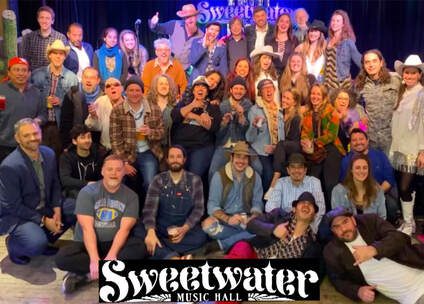 The Sweetwater Music Hall crew.
The Sweetwater Music Hall crew.
Gov. Gavin Newsom announced this week that the state will “fully reopen” its economy on June 15, with the colored-tier system replaced by a new “green tier,” which would be the least-restrictive phase for counties and signals the end of the state’s tiered reopening system, Dee Dee Myers, a senior adviser to Gov. Gavin Newsom, told the Los Angeles Times.
The reopening would hinge on vaccines remaining widely available across the state, avoiding another surge of the virus and keeping the number of coronavirus patients being treated in hospitals low over the next 10 weeks. A mask mandate and limits on large events such as conventions and music festivals would remain in place, Newsom said.
Local officials also will have the authority to implement their own stricter regulations beyond the state’s rules. Marin County Public Health Officer Dr. Matt Willis told the Marin IJ the county could move into the yellow tier during the last week of April at the soonest because a county’s case rate must improve for two straight weeks before it can advance within the reopening scheme.
The average number of new coronavirus cases in Marin, which had flattened out after a steep decline from the winter surge, has begun to drop again, Willis said. “Cases seem to be heading back into a decline, which is encouraging,” Willis said. “But we’ve seen also how fragile this can be.”
As we’ve reported before, demand for vaccines continues to far outstrip the supply of shots, leading Marin County Public Health Officer Dr. Matt Willis to tout his agency’s efforts to deploy vaccines as quickly and efficiently as possible despite limited supply compared to much larger, surrounding counties.
Everyone 16 and older will become eligible on April 15, which could further strain supplies. Newsom said the state, which is receiving 2.4 million doses this week, doesn’t expect to get substantially more than that until May. He acknowledged to the Bay Area News Group that getting appointments for everyone in the widening eligibility pool “is going to take some time, a number of weeks, perhaps over a month.”
Even under the relaxed rules, California will still prohibit convention centers from hosting events of 5,000 or more people until October unless they can prove all attendees have been vaccinated. The state has not yet set a date for allowing large music festivals such as Coachella — though Ghaly said officials are working with organizers to eventually allow those events.
Approximately 61% of Marin residents over the age of 16 have received at least one shot of a coronavirus vaccine and 38% are fully vaccinated, according to data on April 6.
The continued decline of case rates and the expectation of rising vaccine availability could eventually lead to some long overdue good news for the local sector most ravaged by the COVID-19 crisis: live music, theater and entertainment venues like the Sweetwater Music Hall, Throckmorton Theatre and Marin Theatre Company, which have been hit the hardest in the 94941 arts community.
After more than a year without live indoor performances, owners of music and theater venues are cautiously preparing for life after COVID-19 lockdown, the IJ reported. With in the “orange tier,” venues with seating for live indoor performances will be allowed a 25% maximum capacity for in-state visitors starting April 15.
Mask requirements will still be in place and venue owners will be required to provide digital ticket services, pre-designated eating and drinking areas, and a weekly worker COVID-19 testing program, according to state guidelines.
Even with these loosened restrictions, Gabriella Calicchio, director of the county’s Department of Cultural Services, told the IJ it will be tough for performing arts groups to make a profit. “Whether in our own space or somewhere else, ticket sales need to account for at least 50%, if not 70%, of the expense it takes to produce a show,” Calicchio said. “So it is really challenging for any of our performing arts groups in Marin … because they need to break even.”
Dennis Fisco, president and board member of the Sweetwater Music Hall in Mill Valley, told the IJ the venue has managed by holding some outdoor music events and also by becoming a nonprofit. “The pandemic obviously hit us very hard,” Fisco said. “We went from a successful food and live music venue to a complete stop in one day. We have not been permitted to open as a live-music venue since March 12 last year.”
“While we are closed we still have expenses,” he added. “So the board stepped up and we’ve had a tremendous amount of interest from the community in Marin County, San Francisco and the Bay Area in helping us with donations to keep us alive to pay fixed expenses that don’t go away because the doors are closed.”
He said the venue plans to reopen in June and the staff is installing plexiglass, ventilation systems and other safety features. Still, many artists across the Bay Area are struggling.
“It’s tough to book a show and have the performers earn a living at 20% capacity,” Fisco said. “It’s been a sad year for Sweetwater and live music venues, but it’s also sad for the musicians and live music community. Especially for musicians who’ve been out of business all this time.”
